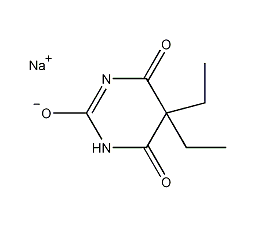barbiturate sodium salt


Structural formula
| Business number | 03WA |
|---|---|
| Molecular formula | C8H11N2O3Na |
| Molecular weight | 206.17 |
| label |
5,5-diethylbarbiturate sodium salt, 5,5-Diethylbarbituric acid sodium salt, Sodium barbital, Veronal sodium salt |
Numbering system
CAS number:144-02-5
MDL number:MFCD00036203
EINECS number:205-613-9
RTECS number:CQ3850000
BRN number:None
PubChem number:24891520
Physical property data
1. Characteristics: White crystal or crystalline powder.
2. Density ( g/mL,25/4℃): Undetermined
3. Relative vapor density (g/mL,Air=1): Undetermined
4. Melting point ( ºC): Undetermined
5. Boiling point ( ºC,Normal pressure): Undetermined
6. Boiling point ( ºC,5.2kPa): Undetermined
7. Refractive Index: Undetermined
8. Flashpoint (ºC): Undetermined
9. Specific optical rotation (º): Undetermined
10. Autoignition point or ignition temperature (ºC): Not OK
11. Vapor pressure (kPa,25ºC): Undetermined
12. Saturation vapor pressure (kPa,60ºC): Undetermined
18. Lower explosion limit (%,V/V): Undetermined
19. Solubility:1gProduct soluble in5mlCold water,2.5mlBoiling water,400mlEthanol, insoluble in ether and chloroform. The aqueous solution reacts alkaline to litmus and phenolphthalein.
Toxicological data
2. Toxicological data:
1, acute toxicity: oral administration to rats LD50 : 600 mg/kg;
Large Mouse abdominal cavity LD50: 300 mg/kg;
Large Mouse subcutaneous LD50: 300 mg/kg;
Large Mouse vein LD50: 280 mg/kg;
Small Rat oral LD50: 800 mg/kg;
Small Mouse vein LD50: 620 mg/kg;
Small Mouse subcutaneous LD50: 700 mg/kg.
Ecological data
3. Ecological data:
Other harmful Effect: This substance may be harmful to the environment, and special attention should be paid to water bodies.
Molecular structure data
None
Compute chemical data
1. Reference value for hydrophobic parameter calculation (XlogP): None
2. Number of hydrogen bond donors: 1
3. Number of hydrogen bond acceptors: 3
4. Number of rotatable chemical bonds: 2
5. Number of tautomers: 2
6. Topological molecule polar surface area 81.6
7. Number of heavy atoms: 14
8. Surface charge: 0
9. Complexity: 284
10. Number of isotope atoms: 0
11. Determine the number of atomic stereocenters: 0
12. Uncertain number of atomic stereocenters: 0
13. Determine the number of chemical bond stereocenters: 0
14. Number of uncertain chemical bond stereocenters: 0
15. Number of covalent bond units: 2
Properties and stability
Stable under normal temperature and pressure. SPAN>
Incompatible materials:Strong oxidizing agentStorage method
Seal and store in a dry and cool place.
Synthesis method
None
Purpose
Serum protein electrophoresis. Liver function tests. Prepare buffer solution. Bacterial culture.
“>Mouse intravenous LD50: 620 mg/kg;
Small Mouse subcutaneous LD50: 700 mg/kg.
Ecological data
3. Ecological data:
Other harmful Effect: This substance may be harmful to the environment, and special attention should be paid to water bodies.
Molecular structure data
None
Compute chemical data
1. Reference value for hydrophobic parameter calculation (XlogP): None
2. Number of hydrogen bond donors: 1
3. Number of hydrogen bond acceptors: 3
4. Number of rotatable chemical bonds: 2
5. Number of tautomers: 2
6. Topological molecule polar surface area 81.6
7. Number of heavy atoms: 14
8. Surface charge: 0
9. Complexity: 284
10. Number of isotope atoms: 0
11. Determine the number of atomic stereocenters: 0
12. Uncertain number of atomic stereocenters: 0
13. Determine the number of chemical bond stereocenters: 0
14. Number of uncertain chemical bond stereocenters: 0
15. Number of covalent bond units: 2
Properties and stability
Stable under normal temperature and pressure. SPAN>
Incompatible materials:Strong oxidizing agentStorage method
Seal and store in a dry and cool place.
Synthesis method
None
Purpose
Serum protein electrophoresis. Liver function tests. Prepare buffer solution. Bacterial culture.
